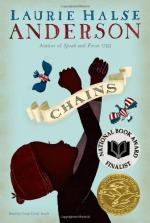
|
| Name: _________________________ | Period: ___________________ |
This test consists of 5 short answer questions, 10 short essay questions, and 1 (of 3) essay topics.
Short Answer Questions
1. What does Madam Lockton say she will do if Ruth has another seizure?
2. Who is Curzon?
3. What is Isabel to do at the Lockton home?
4. What is significant about the day the novel opens?
5. About what do Lockton's guests speak openly?
Short Essay Questions
1. Under what condition does Lockton agree to give the Loyalist money, and why does he stipulate that condition?
2. Why is Isabel terrified when Lockton is released from jail, and why did she need not worry?
3. Why has Miss Mary Finch's nephew come to Rhode Island?
4. What happens the morning after Isabel made a report to Curzon?
5. About what does Becky warn Isabel?
6. What does Curzon tell Isabel about the Locktons, and what promise does he make?
7. What does Isabel struggle to do as she is working about the house?
8. What does the Mayor of New York suggest it is time to do to advance the Loyalist cause?
9. What does Colonel Regen ask Isabel to do and how does he make it possible for her to travel about without being picked up?
10. What happens when Isabel goes and talks to Colonel Regen?
Essay Topics
Write an essay for ONE of the following topics:
Essay Topic 1
Discuss one of the following:
1. Trace and analyze the theme of freedom in "Chains". Consider the following questions as you write: What characters are most concerned with freedom? Why? What are some symbols of freedom? Symbols of slavery? What characters are free? Why are they free?
2. Trace and analyze the theme of courage in "Chains". Which characters struggle with this issue? Why? Which characters seem to possess courage? Why?
3. Trace and analyze the theme of growing up and personal responsibility in "Chains". How does Isabel grow up? How does she try to get others to help her out of her situation? How does she finally end up taking responsibility for helping herself?
Essay Topic 2
It is interesting to note Isabel's struggle in naming herself on the forged pass. She knows she is not a Finch or a Lockton. She considers naming herself after her mother or father as a way of honoring their memory, but she no longer wants to be tied to the past. She is looking forward, embracing her new, free future. She renames herself Isabel Gardener for her favorite memories of home: tending to the garden, the growing new life. Keen readers may remember the seeds Isabel tried to grow when she first moved to the Lockton home. Like Isabel's hopes for freedom, the new growth was crushed during a battle and never replanted. Now, Isabel is figuratively replanting those seeds and waiting to watch her future blossom.
1. Why do you think it matters what name Isabel puts on a false pass? Use examples from "Chains" and your own life to support your answer.
2. Discuss, in depth, why names are important to people. Use examples from the text and your own life to support your answer.
3. Discuss the symbolism of Isabel liking to grow life considering the hardship in her life. Use examples from "Chains" and your own life to support your answer.
Essay Topic 3
Discuss the following:
1. Who is/are the protagonists of the story and why?
2. Who is/are the antagonists of the story and why?
3. Which three secondary characters have the greatest impact on the plot?
4. Are any of the characters dispensable and which ones? Why or why not?
5. Do you think this is a character-driven plot or an action-driven plot? Explain.
|
This section contains 1,188 words (approx. 4 pages at 300 words per page) |

|




